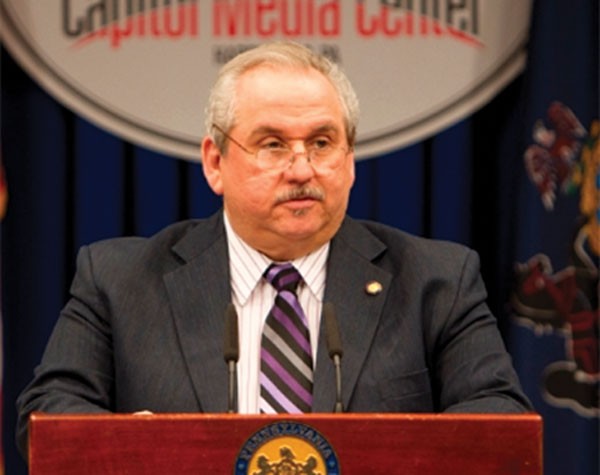In the closing months of his 11-year career as a state senator, Allegheny County Democrat Jim Ferlo announced publicly for the first time that he is gay. The Sept. 23 announcement came in the middle of a press conference pushing for expanded hate-crimes legislation to cover LGBT people. It earned Ferlo the distinction of being the state's first openly gay state senator and one of just three openly gay state legislators, drawing national media attention. City Paper spoke with Ferlo about his decision to come out and the legacy he's leaving behind.
You got your start in politics on Pittsburgh City Council in 1987, where you served two terms as its president. Bruce Kraus, the current council president, is openly gay. Could you have imagined being an out, gay political leader all those years ago?
I think I could imagine it. Many people in the Pittsburgh community obviously have been out front — and I've been progressive on civil-rights and social-justice causes since my teenage years. I don't think there's any secret [about my sexual orientation]. I've never denied it. I never felt I needed to [come out] until yesterday, when I put a billboard on my head. The context of me leaving office; in the context of the moving eloquence that many people spoke yesterday in relation to hate crimes; in the context of many folks, younger folks, and others across the state who may not always talk about their victimization — I just thought it was the right context.
You got hits on The Huffington Post, Gawker and BuzzFeed, among other national outlets. Were you expecting any of that?
No, I guess I was somewhat nonchalant about it. I was concerned about how I would phrase things — and that's why I didn't think about it, to be quite honest with you. I didn't want to have a canned comment. I paused and I just kind of spoke, as I often do, from my own personal emotional viewpoint and I just wanted to speak up. ... I felt a responsibility. I guess I underestimated the stage. When you're a local elected official it's one thing. Being at the capitol, being a state senator, I guess maybe I didn't fully understand the bully pulpit that represents.
Did you ever worry that if being gay were a public part of your persona, it would be hard to negotiate with the more conservative members of the legislature?
No, I don't think so. I just don't think that necessarily needs to be the first calling card [on] an issue. [But] when you're 62 years old and you're not married, that's some perception that people think about. [Laughs.] The way I felt to be most effective — I'm not criticizing anybody who was more open — I've raised lots of money, I've legislatively dealt with issues and always been out front on LGBT community issues. It's not like I ever ran from it.
You mentioned in the press conference that you discovered your homosexuality in your 20s after having fulfilling relationships with women. What was that process of discovery like for you?
I don't know that I can really explain it. I grew up with a large Italian family; I guess it was never a big deal about people's personal situation, to be quite honest with you. Somewhere along the line, I became more attracted to men and it was not a big deal with me. In fact, I went to a party with a friend — a date, I'd guess you call it — but I ended up going home with a guy. I don't know, I can't explain it. There's an old saying in the gay community: "Don't fight the feeling." It just seemed natural to me.
Did being a public official who wasn't officially out cost you personal relationships?
I don't think there's any question about that. I've been married to the political left since the '60s. I always talk about having been arrested 20 times or more for civil rights, anti-war, union demonstrations. I'm proud of that activism and heritage.
You've pushed expanded hate-crimes legislation for LGBT people since 2003, but there isn't a whole lot of social science that suggests toughening sentences on people via hate-crimes legislation does a lot to deter bad behavior. What's your response to that?
I think there's some truth to that, unfortunately. I think to some extent you want the law on the books to give the added element for a prosecutor who utilizes that law appropriately — similar to the situation in Philadelphia [in which a gay couple was beaten there Sept. 11]. Yes, you could have a criminal charge, [but] having the hate crime being the motivating factor, I think that elevates it a lot, not only in terms of the crimes code, but also in terms of the culture and sensibilities of the community-at-large. It's almost like the history of the inappropriateness and racist nature of many people's use of the n-word. You have to change culture.
Do you have any sense of what its chances of passage are?
I don't know. We only have a few session days left. Unfortunately, with the days remaining, it would go to the House and I think we know that death-knell response from [Republican] Mr. [Daryl] Metcalfe, who chairs the state government committee.
Editor's note: The interview has been edited for space and clarity.















